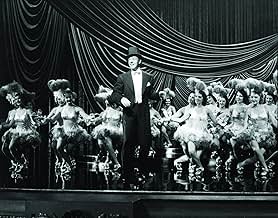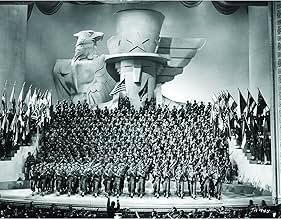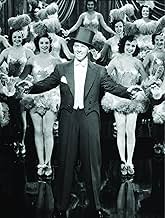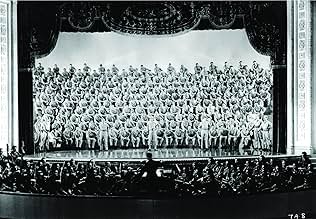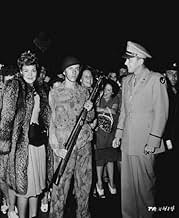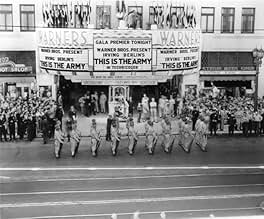This Is the Army
- 1943
- Tous publics
- 2h 1m
IMDb RATING
5.8/10
1.4K
YOUR RATING
A soldier wounded in the War (WWI) becomes a producer and stages a show for the forces.A soldier wounded in the War (WWI) becomes a producer and stages a show for the forces.A soldier wounded in the War (WWI) becomes a producer and stages a show for the forces.
- Won 1 Oscar
- 3 wins & 2 nominations total
Ronald Reagan
- Johnny Jones
- (as Lt. Ronald Reagan)
Alan Anderson
- Assistant Stage Manager Anderson
- (as 1st Sgt Alan Anderson)
Ezra Stone
- M
- (as M/Sgt. Ezra Stone)
- …
Featured reviews
8tavm
Just watched again this, the third of the "war musicals" I'm reviewing for these next few days of which Something for the Boys and Thank Your Lucky Stars were the first two, having seen This is the Army previously during the summer of 1987 on USA Network and again several years later on a Diamond Home Video VHS tape. With the Warner Bros. DVD providing a much better print than the last couple times I've seen this, I managed to have a much better time watching it. In fact, the only times I've cringed were during the blackface "Mandy" number (though the dances-led by Gene Kelly's brother Fred-were enjoyable) and during the "Stage Door Canteen" sketch where we get lame banter of one man dressed as Lynn Fontaine and another as her husband Alfred Lunt, not to mention having another man impersonating European thespians praising the hamburger. Otherwise, this movie had mostly enjoyable comedy especially whenever Alan Hale, Sr.-who is very much like his "Skipper" son in lovable blustery-is on screen, drama with Lt. Ronald Reagan and Joan Leslie debating the merits of marrying before leaving for battle, and musical highlights-like when Kate Smith sings her stirring and iconic rendition of "God Bless America" or even when composer Irving Berlin makes his entrance in his old uniform singing "Oh, How I Hate to Get Up in the Morning" (not to mention an additional song filmed exclusively for English audiences called "My British Buddy" which is an extra on the disc). And the number "That's What the Well-Dressed Man in Harlem Will Wear" isn't all that offensive concerning the African-American performers though I don't think it really was necessary to have boxer Sgt. Joe Louis in this as he just punches a bag during it. All in all, this was a rousingly patriotic show that really delivered. P.S. I have to note that co-screenwriter Capt. Claude Binyon came from my birthtown of Chicago, Ill. And when I first watched this, during the commercials, I switched to other channels and saw live coverage of President Reagan and his wife Nancy consoling various people on the death of loved ones. I'm guessing this was related to the event of May 17 of that year (two days before I graduated from Belaire High School) when 37 American sailors were killed on the U.S.S. Stark after it was set afire by two missiles from an Iraqi airplane. Talk about coincidence...
As a twenty-year resident of Yaphank, New York, which is on Long Island about 60 miles east of Manhattan, I've learned some of the background of this movie.
Irving Berlin wrote "Yip, Yip, Yaphank" while stationed at Camp Upton in Yaphank during WW I. (Camp Upton is now the Brookhaven National Laboratory.) For this show, which was indeed written to be performed by the soldiers, Berlin wrote "Oh, How I Hate to Get Up in the Morning" and the melody of "God Bless America," which was actually cut from the show in its original form.
The show even ran briefly on Broadway in 1918 with a Camp Upton cast, according to the Internet Broadway Data Base.
After the war ended, the songs were put away, then brought out for the morale-boosting efforts of WW II. Berlin frequently rewrote and reused his songs; he revised the lyrics of "God Bless America" for Kate Smith and the rest, as they say, is history.
Irving Berlin wrote "Yip, Yip, Yaphank" while stationed at Camp Upton in Yaphank during WW I. (Camp Upton is now the Brookhaven National Laboratory.) For this show, which was indeed written to be performed by the soldiers, Berlin wrote "Oh, How I Hate to Get Up in the Morning" and the melody of "God Bless America," which was actually cut from the show in its original form.
The show even ran briefly on Broadway in 1918 with a Camp Upton cast, according to the Internet Broadway Data Base.
After the war ended, the songs were put away, then brought out for the morale-boosting efforts of WW II. Berlin frequently rewrote and reused his songs; he revised the lyrics of "God Bless America" for Kate Smith and the rest, as they say, is history.
This is the type of musical that Hollywood did best and it sure was popular with the public. However, 65 years later, the film has lost much of its appeal due to changes in movie styles as well as the fact that the film's value as a propaganda tool is now lost--after all, the war has been over since 1945. So what was rousing and exciting then to the folks at home now just seems rather dated and slow--though the film still does have very good production values.
The film is basically a bazillion patriotic songs rolled up into the thinnest of plots. Frankly, I think the film could have been a lot better had the story received greater emphasis and they'd dropped a few musical numbers. This would have given the film a much needed infusion of energy--though again, back during the war years, this wasn't as big a concern.
The story, such as it is, begins during WWI. A group of soldiers (George Murphy, Alan Hale, George Tobias and Charles Butterworth and others) are interested in performing a musical to raise morale and the when they are given permission, the show is a huge hit. Many years later, when WWII arrives, the children of these same men and others put on their new and timely stage show. It's a major success and the soldiers are sent on a tour of the USA to increase the public's patriotism and backing of the war. There's a little more to the plot than this--but not much.
As I said, it's really just an excuse to string together tons of musical and dance numbers--so many that you feel a bit overwhelmed. Some of the numbers are very good, the one with Irving Berlin was interesting (not good--just interesting from a historical sense) and a few were rather bad. The worst was the one that was a minstrel show--something that you'd hoped would have died out by 1943. It was just embarrassing and makes you cringe. Also, in a few separate parts of the film, Joe Lewis made some irrelevant appearances, as he couldn't sing and was as light on his dancing feet as a rhino! He just looked very lost but you can't blame him--he was ordered to appear in the film and since he was a sergeant, he had no choice!
If I could, I'd give the film a score for 1943 (8) and one for today (4 or 5). But, since I can't, I'll give it a 6. Interesting from a historical standpoint but pretty tough going at times, though some of the songs were catchy and the color cinematography was lovely.
As a history teacher, I was a bit concerned with a couple reviews that gave the film a 1. It wasn't nearly that bad and some of the reasons they gave it such a low score seemed petty. One was a diatribe about why they hated Ronald Reagan and really didn't review the film itself. Another was very critical about how the film was propaganda. My answer to that is YES it is propaganda and so what?! Given that it was a life and death struggle for survival in WWII only a knucklehead would see this sort of propaganda as an evil! Should Hollywood have either ignored the war or done pro-Hitler films instead?! Read your history books or talk to some vets before you make such silly assertions.
The film is basically a bazillion patriotic songs rolled up into the thinnest of plots. Frankly, I think the film could have been a lot better had the story received greater emphasis and they'd dropped a few musical numbers. This would have given the film a much needed infusion of energy--though again, back during the war years, this wasn't as big a concern.
The story, such as it is, begins during WWI. A group of soldiers (George Murphy, Alan Hale, George Tobias and Charles Butterworth and others) are interested in performing a musical to raise morale and the when they are given permission, the show is a huge hit. Many years later, when WWII arrives, the children of these same men and others put on their new and timely stage show. It's a major success and the soldiers are sent on a tour of the USA to increase the public's patriotism and backing of the war. There's a little more to the plot than this--but not much.
As I said, it's really just an excuse to string together tons of musical and dance numbers--so many that you feel a bit overwhelmed. Some of the numbers are very good, the one with Irving Berlin was interesting (not good--just interesting from a historical sense) and a few were rather bad. The worst was the one that was a minstrel show--something that you'd hoped would have died out by 1943. It was just embarrassing and makes you cringe. Also, in a few separate parts of the film, Joe Lewis made some irrelevant appearances, as he couldn't sing and was as light on his dancing feet as a rhino! He just looked very lost but you can't blame him--he was ordered to appear in the film and since he was a sergeant, he had no choice!
If I could, I'd give the film a score for 1943 (8) and one for today (4 or 5). But, since I can't, I'll give it a 6. Interesting from a historical standpoint but pretty tough going at times, though some of the songs were catchy and the color cinematography was lovely.
As a history teacher, I was a bit concerned with a couple reviews that gave the film a 1. It wasn't nearly that bad and some of the reasons they gave it such a low score seemed petty. One was a diatribe about why they hated Ronald Reagan and really didn't review the film itself. Another was very critical about how the film was propaganda. My answer to that is YES it is propaganda and so what?! Given that it was a life and death struggle for survival in WWII only a knucklehead would see this sort of propaganda as an evil! Should Hollywood have either ignored the war or done pro-Hitler films instead?! Read your history books or talk to some vets before you make such silly assertions.
This movie was produced as a fund-raiser and as a morale booster. At the time it was filmed we were on the verge of losing the war and the public needed a patriotic lift. The songs are not, perhaps, the best Irving Berlin ever wrote, but they speak of the era in which they were written. For those who are politically-correct, I agree that African-Americans are not shown in the best light, but, right or wrong, that was the attitude then. The minstrel show was still a popular entertainment and the idea of white actors in black-face was considered simply show business. This show was actually staffed by real, honest-to-goodness soldiers with a few actors tossed in for the starring roles. Even if you dislike the movie, appreciate it for the look it gives into American life during the 40s. I, for one, enjoy it a lot and have watched it a half-dozen times. By the way, the sound on the VHS tape is better than on several of the DVD versions that are available.
Most of Irving Berlin's shows on Broadway were revues and not book type shows. For that reason they're not frequently revived. All of them contain topical jokes that only history majors like myself would get now. But the extreme topicality of This Is The Army and its World War I predecessor Yip Yap Yaphank guarantee you don't see this one revived too often no matter how many good songs come from it.
Even to do This Is The Army we have a threadbare plot of sorts. George Murphy is a song and dance man doing the lead in the Ziegfeld Follies when he gets his draft notice for World War I. Like Irving Berlin in real life, he offers to put his entertainment talents at the army's disposal. Murphy also marries Rosemary DeCamp at the same time he goes in the army.
Flash forward to a new World War and Murphy's son Ronald Reagan is going out with Joan Leslie who's the daughter of Charles Butterworth another performer from the Yip Yap Yaphank show back in the day. Reagan gets his draft notice just like dear old dad and he says let's put on a show for the boys. Of course dear old dad volunteers to help as do other veterans of the World War I show.
One thing that Warner's was smart about, they didn't give Ronald Reagan any singing or dancing to do. Reagan's talents such as they are were confined to behind the curtain.
A lot of Hollywood regulars are mixed with members of the original cast of actual soldiers who put on This Is The Army on Broadway. The score is also a mixed one with Irving Berlin allowing several of his older numbers mixed in with the Broadway score of This Is The Army. Most particularly God Bless America which Kate Smith had introduced in 1939 and sang in the film. It dwarfs all the other numbers in the score by comparison, in fact it's only rival in popularity in this film is Irving Berlin's soldier's lament of Oh How I Hate To Get Up In The Morning. And that originally comes from Yip Yap Yaphank. And of course that other barracks ballad telling what civilians will have to do without, the title song of the show and the film.
This Is The Army is dated flag-waving to be sure, but as Irving Berlin said in another song in another show, do you know of a better flag to wave? Both Yip Yap Yaphank and This Is The Army are the product of an immigrant kid who escaped poverty and persecution in the old world of Europe. If Irving Berlin's life isn't the American success story than I don't know a better example. He was grateful to his adopted country and these shows were his way of payback.
I doubt if B picture actor Ronald Reagan had the remotest conception that he would be sitting in the White House as a tenant one day and that he would be giving the nation's greeting to Irving Berlin on his 100th birthday. But that's an American success story too.
Even to do This Is The Army we have a threadbare plot of sorts. George Murphy is a song and dance man doing the lead in the Ziegfeld Follies when he gets his draft notice for World War I. Like Irving Berlin in real life, he offers to put his entertainment talents at the army's disposal. Murphy also marries Rosemary DeCamp at the same time he goes in the army.
Flash forward to a new World War and Murphy's son Ronald Reagan is going out with Joan Leslie who's the daughter of Charles Butterworth another performer from the Yip Yap Yaphank show back in the day. Reagan gets his draft notice just like dear old dad and he says let's put on a show for the boys. Of course dear old dad volunteers to help as do other veterans of the World War I show.
One thing that Warner's was smart about, they didn't give Ronald Reagan any singing or dancing to do. Reagan's talents such as they are were confined to behind the curtain.
A lot of Hollywood regulars are mixed with members of the original cast of actual soldiers who put on This Is The Army on Broadway. The score is also a mixed one with Irving Berlin allowing several of his older numbers mixed in with the Broadway score of This Is The Army. Most particularly God Bless America which Kate Smith had introduced in 1939 and sang in the film. It dwarfs all the other numbers in the score by comparison, in fact it's only rival in popularity in this film is Irving Berlin's soldier's lament of Oh How I Hate To Get Up In The Morning. And that originally comes from Yip Yap Yaphank. And of course that other barracks ballad telling what civilians will have to do without, the title song of the show and the film.
This Is The Army is dated flag-waving to be sure, but as Irving Berlin said in another song in another show, do you know of a better flag to wave? Both Yip Yap Yaphank and This Is The Army are the product of an immigrant kid who escaped poverty and persecution in the old world of Europe. If Irving Berlin's life isn't the American success story than I don't know a better example. He was grateful to his adopted country and these shows were his way of payback.
I doubt if B picture actor Ronald Reagan had the remotest conception that he would be sitting in the White House as a tenant one day and that he would be giving the nation's greeting to Irving Berlin on his 100th birthday. But that's an American success story too.
Did you know
- TriviaThe #1 moneymaker of 1943.
- GoofsThe uniform worn by Gertrude Niesen in the opening sequence is strictly of a 1943, not 1917, design, complete with padded shoulders and knee length skirt, and totally inappropriate to the 1917 era.
- Quotes
Irving Berlin: [singing] I've been a soldier quite awhile and I would like to state, the life is simply wonderful, the Army food is great. I sleep with 97 others in a wooden hut, I love them all, they all love me, It's very lovely, but - Oh, how I hate to get up in the morning...
- Crazy creditsIn the Credits, the cast members are listed in the following order: first the members, who never served in World War II, than the members of the US Armed Forces, starting with Lt. Ronald Reagan.
- Alternate versionsOriginally shown with a pre-credits overture and exit music after the film ends, both of which have been restored on the official DVD release.
- ConnectionsFeatured in Show-Business at War (1943)
- How long is This Is the Army?Powered by Alexa
Details
Box office
- Gross US & Canada
- $20,831,178
- Runtime
- 2h 1m(121 min)
- Aspect ratio
- 1.37 : 1
Contribute to this page
Suggest an edit or add missing content


